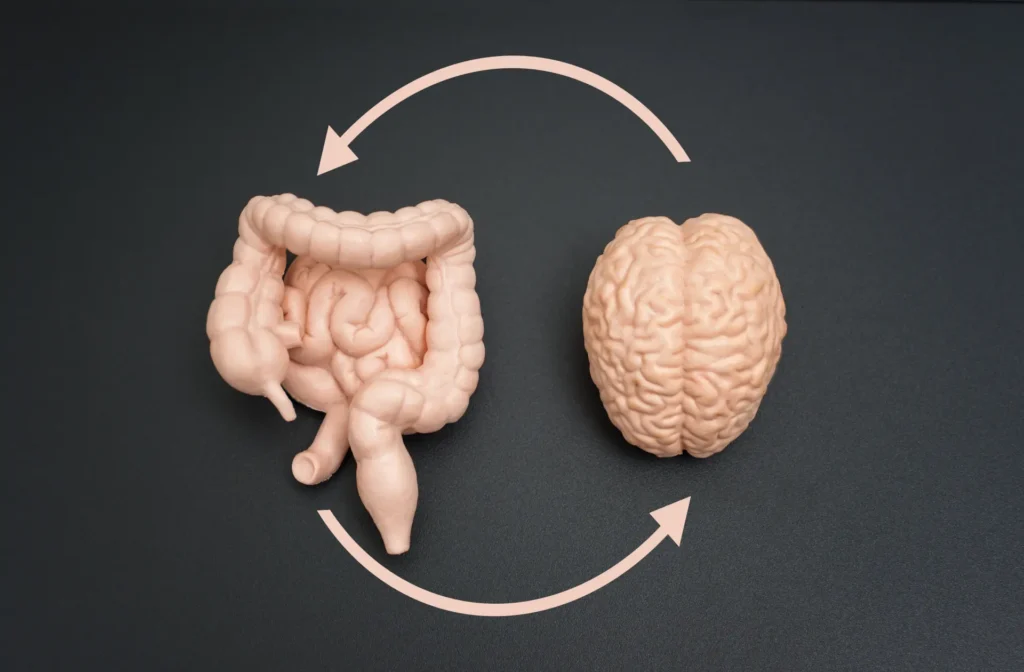How ABM’s natural beta-glucans may nourish beneficial bacteria, support gut lining health, and help your immune system find balance from the inside out.
Mushrooms: More Than Just a Superfood
Mushrooms have long been a part of traditional health systems across the globe. Today, they’re also gaining traction in modern science—not just for their immune effects, but for their deep connection to a critical foundation of health: the gut microbiome.
Mushrooms like Agaricus blazei Murill (ABM) contain a special category of carbohydrates known as polysaccharides, especially beta-glucans. These are not digested by human enzymes—but they’re eagerly consumed by our gut microbes. This makes them natural prebiotics: compounds that help beneficial bacteria thrive while strengthening the immune-gut connection.
Why Prebiotics Matter—and Why Mushrooms Are Uniquely Effective
Your gut is home to trillions of microbes that influence digestion, mood, immune defense, and inflammation. These microbes rely on what you feed them—especially prebiotics, which serve as their fuel.
When beneficial bacteria such as Lactobacillus and Bifidobacterium ferment mushroom-derived polysaccharides, they produce short-chain fatty acids (SCFAs) like butyrate, propionate, and acetate. These tiny molecules:
- Feed the cells that make up your gut lining
- Reduce oxidative stress and support a strong barrier
- Regulate immune activity in and beyond the gut【1】【2】
ABM extract in particular has been shown to shift the microbiota toward beneficial species and boost SCFA production in both animal and human studies【3】.
Beta-Glucans: A Conversation with the Immune System
Unlike common dietary fibers, beta-glucans from mushrooms do more than feed microbes—they talk to your immune system. Specifically, they interact with receptors such as dectin-1 on immune cells like macrophages and dendritic cells.
This interaction helps the body train its immune response. Instead of amplifying inflammation, it supports measured, appropriate defense. ABM beta-glucans have been shown to encourage this kind of immune training, particularly at the intestinal level, where immune tolerance is critical【4】.
This is why ABM’s prebiotic effects are often described as balancing rather than stimulating. They help the immune system recalibrate—not overreact.
SCFAs: Unsung Heroes of Gut and Immune Health
SCFAs like butyrate aren’t just waste products—they’re messengers. When good bacteria ferment mushroom polysaccharides, these molecules:
- Reinforce tight junctions between gut lining cells
- Help immune cells differentiate into regulatory T cells (Tregs)
- Inhibit excessive inflammation and cytokine production
ABM extract supports the fermentation process that leads to higher butyrate output, offering a downstream benefit that can affect everything from energy metabolism to immune balance.
Why Mushroom Prebiotics May Be Ideal for Modern Microbiomes
Today’s gut microbiomes are often under siege—from ultra-processed foods, chronic stress, medications, and environmental toxins. This leads to lower microbial diversity and a more fragile gut lining.
ABM mushrooms, especially in fruiting-body extract form, contain a complex matrix of compounds—not just beta-glucans, but ergothioneine, enzymes, and trace minerals—that may support the microbiome more holistically than isolated fiber supplements.
These natural compounds can:
- Restore microbial balance
- Promote a thicker mucus barrier
• Protect gut tissues from oxidative damage - Support the communication lines between gut, brain, and immune cells
Unlike many one-dimensional prebiotics, ABM mushrooms offer multi-targeted support for microbial resilience.
Bottom Line
Your gut thrives when you feed it right—and mushrooms like ABM may be the missing link.
ABM’s unique blend of beta-glucans and functional polysaccharides helps nourish beneficial gut bacteria, enhance immune balance through gut signaling, and encourage the production of SCFAs that build strength from within.
As more research explores the gut–immune–microbiome connection, functional mushrooms are proving to be more than a wellness trend. When grown and extracted properly—like the clinically pure, fruiting-body ABM used by Desert Forest Nutritionals®—they offer real, food-based tools to help restore balance from the inside out.
Coming Up Next…
What do your mood, immune cells, and even bones have in common? More than you think—and your gut microbiome is at the center of it all. In our next post, we’ll explore how Agaricus blazei Murill may influence the powerful gut–brain–bone connection. You won’t look at mushrooms the same way again.
Bibliography
- Luo, J., et al. (2022). Polysaccharides and extracts from Agaricus brasiliensis Murill: bioactivities and gut-microbiota modulation. Journal of Functional Foods, article in press.
- Volman, J. J., Ramakers, J. D., & Plat, J. (2008). Dietary modulation of immune function by beta-glucans. Physiology & Behavior, 94(2), 276–284.
https://doi.org/10.1016/j.physbeh.2007.11.045 - Kvalheim, G., Lyberg, T. et al. (2008). Effects of the Medicinal Mushroom Agaricus blazei Murill on Immunity, Infection and Cancer. Scandinavian Journal of Immunology. Science Biology+5
- Mukhopadhya, I. & Louis, P. (2025). Gut microbiota‑derived short‑chain fatty acids and their role in human health. Nature Reviews Microbiology.

